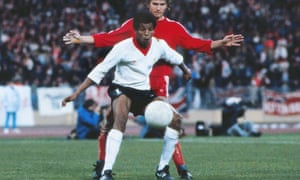 |
| Howard Gayle playing for Liverpool against Bayern Munich in 1981. Photograph: Colorsport/Rex/Shutterstock |
Grebby told me that I had been nominated, without my knowledge, for an MBE and asked if I would be willing to accept it. I said no. I didn’t even have to think about it, because I have always had a very keen sense of Africa and colonialism. My father came here from Sierra Leone after the war to build this country and I have always been aware of the impact of colonialism – then and now – on Africa and on my life. Grebby said he knew that would be my answer.
There has been a lot of comment about this, so let me explain. The fact is that I felt it would be a slap in the face for so many to be part of that British empire process. When you look at what the empire did to my family and our ancestors, it just doesn’t bear credence. I would always have felt uncomfortable writing those letters after my name.
I am British, I was born here and my children were born here. There is no argument to be had about my patriotism. But the empire is something that oppressed black people.
I have done a lot of work with young people in Liverpool and beyond, because my role in the history of Liverpool FC means I can make an impact when others might not. Like everyone else, I am grateful when my work is recognised. Over the years, I have received many awards, from other organisations and from my own community, and I have always been pleased and proud to accept them. But not this.
I always knew, because of the sort of work that I do, that there was a possibility of an honour and, having thought it through, I always knew that I would not accept it. It made the decision last week very easy.
It’s worth saying too that it has generally been well received. I didn’t expect this huge attention when I mentioned my decision on my Facebook page. I was just informing those who like to keep up with what I am doing. But since it was picked up, first by the Liverpool Echo, I have had a lot of support from friends and family, from a large number of people in Liverpool, and encouraging messages from around the world.
The support from Liverpool was especially pleasing, but not surprising. As the world has seen from the Hillsborough campaign, we are a people very alive to issues of injustice.
As I see it, this is about the past, but also about the present, because I don’t think there has ever been any recognition of what was done in Britain’s past. The education system told me nothing but lies about Africa. Just the other day I saw a documentary about the fact that so many British families that got rich on the back of the slave trade received compensation when Britain’s involvement ended. That had a big impact on me. If there had been some proper recognition here of the way the empire treated Africa and Africans, I might have looked at this nomination differently. Other atrocities in history have been recognised, with compensation paid.
But Britain hasn’t really learned the lessons of its past. We are always in conflict with other nations, always making the same mistakes. I’m making my point now, but in 100 years will there be some Arab man or woman refusing an honour because of what we have done to Iraq or Syria? We have war memorials and every year we add to the list of conflicts.
I know other black people choose to accept these awards and I don’t condemn their choices. That’s for them. But this was a matter for my conscience.
I doubt that anyone will change the process because of what I say, but I think we should just get rid of these awards, and the empire link that sends such a dreadful message to people of colour. Quite apart from the historical association, all sorts of people get them who shouldn’t, and so many deserving people miss out. It seems a farce. People who have really made a difference should be nominated by their communities.
There has been some negative response – one would expect that – but that’s OK. I was a young footballer at a time when fans could shout racial insults with impunity. I have had to deal with a lot of racism before and during my life in football. I’ve learned to do that. And anyway, the critics are not the ones that matter. I have never regretted any part of my life, but in this case the support I have had confirms my firm belief that I did the right thing.




0 Comments